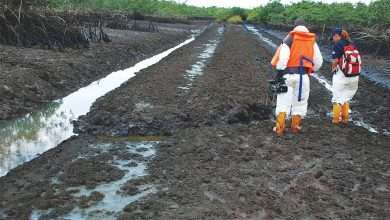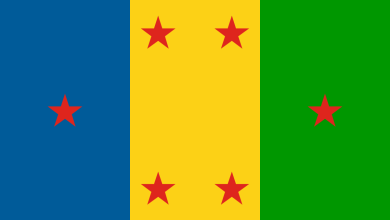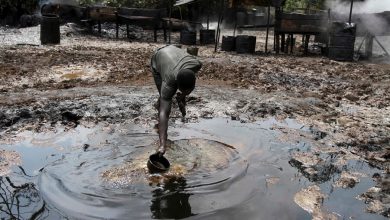Ex-militants to Secure Cleaning Up of Ogoniland – Brig. Gen. Boroh
As the Nigerian government plan to end the current Presidential Amnesty Programme for the rehabilitation of ex-Niger-Delta militants, there is a concluded arrangement to use the ex-militants in the clean up of the Ogoniland, in Rivers State and other Niger Delta region.
The Special Adviser to the President on Niger Delta and Coordinator of the Presidential Amnesty Programme, Brig Gen. Paul Boroh (rtd), gave the indication at a parley with media executives in Abuja on Monday.
On whether Ogoni land is secured enough to allow for environmental cleaning of the ecosystem and other environs, Boroh assured that the Presidential Amnesty Programme office has been liaising with stakeholders to ensure a conducive atmosphere for the task ahead.
He said, “The cleaning exercise will soon start in Ogoni land, in the next month. The cleaning of Ogoni land is one of the best projects in the Niger-Delta.
“For us, it’s just to prepare the ground, we have been working with stakeholders, including ex-militants, they are going to secure the place. We have already spoken with them, I have spoken with Ateke Tom about it.”
Boroh further stated that the current leadership at the Amnesty Office has ushered in a rancour- free relationship in the Niger-Delta, stressing that, “though it’s not over yet, there have not been crises that will cause disturbances.”
He said: “We are thinking of an exit strategy because you cannot be paying so much even though peace is expensive.”
Boroh explained that, “exiting the 3,232 beneficiaries will save government about N2.5 billion in stipend payments this year. A second batch of 1,042 who are currently being given starter packs to establish their individual businesses are soon to be exited from the programme which will result in N812 million savings for government this year.
“Depending on the budgetary allocation and release, the Amnesty Office plans to exit an additional 2,958 beneficiaries by the end of this year which will amount to N2.3 billion savings that would otherwise have been spent on stipend payments,” he said.
“The exercise is a significant step in the five-year Amnesty Programme which has never exited any of the 30,000 beneficiaries. It is also part of the exit strategies for the Presidential Amnesty Programme.
“So far, the Amnesty Programme has trained 17,322 of the beneficiaries, leaving a balance of 12,678. Additionally, it has embarked on the domestication of all its programmes.
“Currently, five of its 49 training centres are offshore while its has students in 131 tertiary institutions abroad. With effect from 2015/2016 session, 95 per cent of the student deployment was for local institutions.”
He said the programme has awarded scholarships to about 5,234 beneficiaries in tertiary institutions; 3,082 gained admission in the country, 2,150 abroad, while 272 have graduated.
Speaking on the security of the Niger-Delta region, Boroh contended that the setting up of National Coast Guards would help tremendously in securing the nation’s oil economy, maritime and other oil installations in the region, adding: “there is need for Nigeria to have a Coast Guards. “
He stressed that the Nigerian Navy as presently constituted does not have security of the creeks as its primary mandate, arguing that only the Coast Guards can perform such functions.
On the task of running an amnesty programme of this nature, Boroh warned against a repeat of the amnesty in other regions.
“We don’t want a repeat of this programme in other regions; we must do all we can in order not to allow other regions to come up and say they want to do amnesty programme also,” he said.




